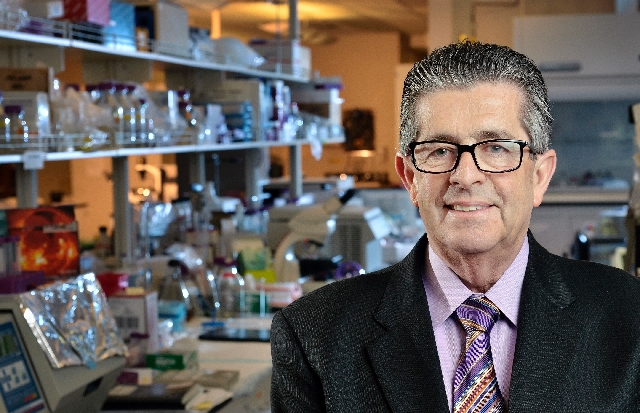Q&A with Michael Harter, senior provost and CEO, Touro University Nevada

Touro University senior provost and CEO Michael Harter, who helped found the school in 2004, recently announced his impending retirement. The New York native, with a long and varied career in health care education, has made his mark at several institutions, including The Ohio University, the State University of New York, California State University Sacramento and the University of Nevada School of Medicine. He is married to Carol Harter, who was president of the University of Nevada, Las Vegas from 1995 to 2006 and now serves as executive director of the Black Mountain Institute at UNLV.
Touro University Nevada is a nonprofit, Jewish-sponsored private institution offering advanced degree programs in osteopathic medicine, allied health sciences and education. It has more than 1,300 students, along with a full-service health clinic and a center for autism and developmental disabilities. The Henderson school is a branch of the Touro College and University System, which has approximately 19,000 students in the United States and Israel.
Question: How did you become involved in health care education?
Answer: I’ve always been a teacher, and my Ph.D is in education, but my entry into health care was serendipitous. When Carol and I were living in Ohio, I took a job as director of a program to provide services for children in Appalachia. We had a child health clinic and five day care centers, three with units for children with multiple handicaps. I pulled together all the recommendations from the different therapists to develop a coordinated plan for each child and I learned a lot about health care finance by setting up the clinics. I began teaching health care finance, the health aspects of aging and comprehensive health care planning at Ohio University and eventually became the dean of its health and human services college.
Question: What brought you to Las Vegas?
Answer: Carol and I were both working at State University of New York in 1995 when she was named president of UNLV. I stayed in New York. Every day she’d call me before she left her office around 8 p.m., but because of the time difference, I might already be asleep. I eventually took a position as dean of health and human services at CSU Sacramento, which was at least in the same time zone. And when an opportunity opened up with the University of Nevada School of Medicine in Las Vegas, I moved here in 2000. We were apart for nearly five years, which was hard.
Question: How did you end up as Touro’s CEO?
Answer: As vice dean of the school of medicine, I ran the Southern Nevada campus, and was responsible for the undergraduate medical school, the graduate medical education programs and the practice corporation. After four years there, I was recruited by Touro University to help set up a campus in Southern Nevada. I accepted the opportunity to be its first CEO, and in April 2004, we started to build out this gigantic warehouse and turn it into a medical school, plus a lot of other programs. Touro offers programs that are either unique or in high demand all over the country. Our physician assistant and occupational therapy programs are the only ones of their kind in the state. Our PA program has been enormously successful, graduating more than 50 students a year.
Question: What do you see as the future of health care?
Answer: With the Affordable Health Care Act, there might be as many as
30 million more people coming in the front door of the health care delivery system instead of waiting until they’re very sick and going to the emergency room for treatment. I set up a “well child” clinic when I was working with family development programs in Appalachia, and virtually every child we saw had some kind of medical problem. That to me is an example of people living with pain and not getting medical attention because they can’t afford it. So I’m convinced that there will be a lot more people coming in, and they’ll be diagnosed with problems that will require not only physicians but also the services of other health science professionals like nurse practitioners and PAs.
Question: Have you made plans for your retirement?
Answer: We have a condo in San Diego, and we’ll probably divide our time between both places. I’ve agreed to stay at Touro during the transition, but then I think I’ll move on. Knowing myself, I’d have to be in control, and if I continued to work here, I’d be a thorn in the side of the new CEO. Maybe later, I’ll be able to volunteer for something without feeling the need to run the agency where I’m volunteering.
Contact freelance reporter Kay Foley at kayfoleylv@hotmail.com












